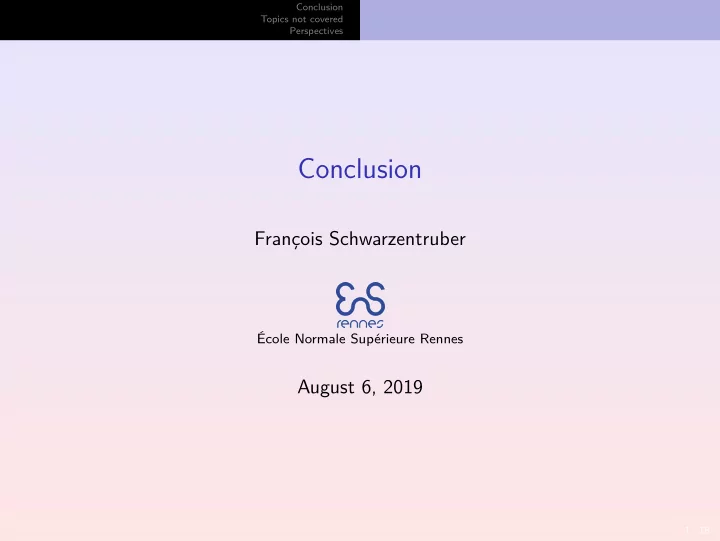

Conclusion Topics not covered Perspectives Conclusion François Schwarzentruber École Normale Supérieure Rennes August 6, 2019 1 / 18
Conclusion Topics not covered Perspectives Outline Conclusion 1 2 Topics not covered 3 Perspectives 2 / 18
Conclusion Topics not covered Perspectives Conclusion Notions Epistemic logic Syntax, Semantics, Succinctness, Model checking, Satisfability Knowledge and seeing Abstraction Knowledge and time Interaction Dynamic epistemic logic Automatic structures VS Turing- complete, no knowledge about the strategies of others Knowledge-based programs Common knowledge of the strategies of others 3 / 18
Conclusion Topics not covered Perspectives Outline Conclusion 1 2 Topics not covered 3 Perspectives 4 / 18
Conclusion Topics not covered Perspectives Other topics not covered Belief revision, plausibility models [ Baltag et al. Chap. 7 of Handbook of epistemic logic ] Probabilistic dynamic epistemic logic Distributed systems and interpreted systems. Modeling protocols. Proof theory. Soundness and completeness of axiomatization. Finite model property. Bisimilation. Bisimilation contraction. 5 / 18
Conclusion Topics not covered Perspectives Outline Conclusion 1 2 Topics not covered 3 Perspectives 6 / 18
Conclusion Topics not covered Perspectives Perspectives Provide efficient algorithms for epistemic planning Synthesis Knowledge-based programs (mix of Reinforcement Learning and tracking the emergence of epistemic reasoning?) Face the logical omniscience problem 7 / 18
Conclusion Topics not covered Perspectives Limited belief Issue when interacting with humans: logical omniscience Because knowledge computation not modeled in the semantics . I know you know the perfect move at Chess. 8 / 18
Conclusion Topics not covered Perspectives Limited belief 9 / 18
Conclusion Topics not covered Perspectives Limited belief Solution Model the knowledge computation via proof systems ! [ Levesque, 1984 ], [ Lakemeyer, 1994 ], [ Kaplan and Schubert, 2000 ] Deduced facts (implicit beliefs) ˆ K a q K a p Knowledge base K a K b q (explicit beliefs) K a r K a K b ( p ∧ q ) [ Liu et al., 2004 ], [ Schwering, 2017 ], [ Chen, Saffidine, Schwering, 2018 ] 10 / 18
Conclusion Topics not covered Perspectives Limited belief Solution Model the knowledge computation via proof systems ! [ Levesque, 1984 ], [ Lakemeyer, 1994 ], [ Kaplan and Schubert, 2000 ] Deduced facts (implicit beliefs) Knowledge base (explicit beliefs) novice [ Liu et al., 2004 ], [ Schwering, 2017 ], [ Chen, Saffidine, Schwering, 2018 ] 11 / 18
Conclusion Topics not covered Perspectives Limited belief Solution Model the knowledge computation via proof systems ! [ Levesque, 1984 ], [ Lakemeyer, 1994 ], [ Kaplan and Schubert, 2000 ] Deduced facts (implicit beliefs) ˆ K a p Knowledge base (explicit beliefs) beginner [ Liu et al., 2004 ], [ Schwering, 2017 ], [ Chen, Saffidine, Schwering, 2018 ] 12 / 18
Conclusion Topics not covered Perspectives Limited belief Solution Model the knowledge computation via proof systems ! [ Levesque, 1984 ], [ Lakemeyer, 1994 ], [ Kaplan and Schubert, 2000 ] Deduced facts (implicit beliefs) ˆ K a q K a p Knowledge base K a K b q (explicit beliefs) intermediate [ Liu et al., 2004 ], [ Schwering, 2017 ], [ Chen, Saffidine, Schwering, 2018 ] 13 / 18
Conclusion Topics not covered Perspectives Limited belief Solution Model the knowledge computation via proof systems ! [ Levesque, 1984 ], [ Lakemeyer, 1994 ], [ Kaplan and Schubert, 2000 ] Deduced facts (implicit beliefs) ˆ K a q K a p Knowledge base K a K b q (explicit beliefs) K a K b ( p ∧ q ) expert [ Liu et al., 2004 ], [ Schwering, 2017 ], [ Chen, Saffidine, Schwering, 2018 ] 14 / 18
Conclusion Topics not covered Perspectives Limited belief Solution Model the knowledge computation via proof systems ! [ Levesque, 1984 ], [ Lakemeyer, 1994 ], [ Kaplan and Schubert, 2000 ] Deduced facts (implicit beliefs) ˆ K a q K a p Knowledge base K a K b q (explicit beliefs) K a r K a K b ( p ∧ q ) omniscient [ Liu et al., 2004 ], [ Schwering, 2017 ], [ Chen, Saffidine, Schwering, 2018 ] 15 / 18
Conclusion Topics not covered Perspectives Limited belief Theorem With one agent, theorem proving is: NP-complete, but PSPACE-complete when the belief level is part of the input [ Chen, Saffidine, Schwering, 2018 ] Question Extension to the multi-agent case? Extension to DEL actions? Provide approximate solutions? 16 / 18
Conclusion Topics not covered Perspectives Hintikka’s World Implement many different models belief revision, plausibility models probabilistic models interpreted systems explicit VS implicit beliefs verification/synthesize of knowledge-based programs A tool for advertising AI techniques Planning SAT Sampling (cf. Kuldeep’s talk) 17 / 18
Conclusion Topics not covered Perspectives Trugarez bras. Merci. Thank you. Feel free to use it! http://hintikkasworld.irisa.fr/ 18 / 18
Recommend
More recommend